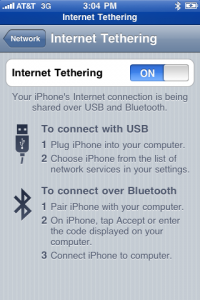AT&T To Revoke Unlimited Data Plans From Jailbreaking iPhone Tetherers | Wired.com
The fight over tethering (or using a cell phone to access the internet on a nearby computer) might appear at first blush to be a classic company-wants-to-charge-more vs customer-wants-to-pay-less battle. At its heart, however, the quarrel might be said to be over control of consumer devices — or more specifically, what one might connect to a phone. AT&T and their gang likely do not want customers to know that this is a battle that they have already lost.
The history

As you may know, phone service in America operated as a natural monopoly and was regulated by the FCC. A condition in that monopoly allowed AT&T to be the sole provider of telephone equipment, and to prohibit devices from being attached to a telephone (and thus the network).
No equipment, apparatus, circuit or device not furnished by the telephone company shall be attached to or connected with the facilities furnished by the telephone company, whether physically, by induction or otherwise. (FCC Tariff Number 132)
The Hush-A-Phone and Carterfone devices were responsible for pushing the limits of this rule. Most notably, the inventor of the Carterfone (a device for extending the range of a telephone — which might be very useful on a large Texas ranch) put his own money on the line to fight AT&T and the FCC to get the rule changed. He was eventually successful in convincing the FCC to overrule the device-prohibiting tariff. The common parlance for the decision is that “any lawful device” might be connected to the network.
Carter’s invention has been credited with stimulating non-AT&T phones, services, and most importantly, devices like early “acoustic coupler” modems. This is perhaps an example of how the least controlled products and services push adoption, and ultimately innovation.
(For an excellent and brief rundown of the history, please read Any lawful device: 40 years after the Carterfone decision.)
The rub
One might reasonably think that using a smartphone to connect a computer to the internet sounds very much like what is described above. I would go further – using an existing account is functionally equivalent to yesterday’s acoustic coupler. A smartphone should essentially be considered a potential modem for a computer.
What’s holding everyone back is that wireless carrier’s contracts and acceptable use policies prohibit “unauthorized” tethering. While private companies are free to make contracts with their customers, I would argue that they are not free to universally ban a practice that has been permitted for 50 years.
AT&T uses security as a rationale, stating:
Examples of system or network security violations include but are not limited to … using manual or automated means to avoid any use limitations placed on the IP Services.
The question
Should a computer connected to the internet via a smartphone be counted as “any lawful device?” Other than the economic harm of loss of additional charges and the potential harm of increased cellular network load, does tethering cause any harm to the network.
There have been efforts to renew the Carterphone decision for the Internet age. Now that AT&T and Verizon have renewed their efforts against tetherers who do not pay the fee, these efforts should be renewed. For those that are ok practicing a bit of civil disobedience, there are options (I do not take responsibility for any impact this might have on your contract).
